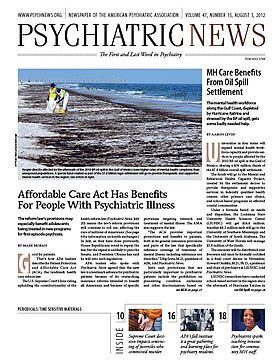It’s the very definition of a vicious cycle: Acute coronary syndromes (ACS; myocardial infarction or unstable angina) can induce post-traumatic stress disorder (PTSD), and ACS-induced PTSD may increase patients’ risk for subsequent cardiac events and mortality.
Researchers at Columbia University Medical Center, seeking to shed light on the “underdiagnosis” of PTSD cases in cardiology practice, published in the June 20 PLoS ONE their meta-analysis of studies that reported a valid estimate of the prevalence of ACS-induced PTSD.
Lead author Donald Edmondson, Ph.D., an assistant professor of behavioral medicine at the Center for Behavioral Cardiovascular Health at Columbia University Medical Center, told Psychiatric News how the effort came about. “Last year, we found that a substantial proportion of patients in a large cohort study of acute coronary syndrome patients conducted by our group displayed substantial PTSD symptoms, and that those symptoms were associated with increased risk for future cardiac events and mortality. The meta-analysis grew out of that study. We wanted to see how big of a problem this really was.”
And a big problem it proved to be: “Our analyses indicated that ACS-induced PTSD symptoms are associated with an approximate doubling of risk for recurrent cardiac events or mortality,” wrote Edmondson and his colleagues. The group quantified the tremendous financial cost of their findings too.
“Given that 1.4 million patients are discharged from U.S. hospitals each year with a diagnosis of ACS, these results suggest that 168,000 ACS patients in the United States alone will develop clinically significant PTSD symptoms due to ACS,” they pointed out. “Among ACS patients in the United States, 20 percent are hospitalized again within one year of the ACS event, and 60 percent of the $1.5 billion spent annually to treat ACS in the United States is due to subsequent hospitalizations. It appears that ACS-induced PTSD may contribute to repeated hospitalization and mortality at a rate very similar to that reported for depression, an approximate doubling of risk.”
What does this mean for clinicians dealing with ACS patients? “At this stage, we really just want cardiologists and patients to understand that PTSD can and does occur due to cardiac events, to know what symptoms to look for, and to know that effective PTSD treatments exist,” explained Edmondson. “Whether universal screening for PTSD would be beneficial is an empirical question that would require a randomized controlled trial.”
And Edmondson and his colleagues are conducting further research on the topic. “Right now we are interested in pursuing two questions,” he told Psychiatric News. “First, we want to know why ACS-induced PTSD is associated with increased risk for adverse outcomes. Within that question we are interested in investigating both physiological and behavioral mechanisms. Second, we are very interested in determining whether there are alterations to the medical environments in which these ACS events occur that could be made to offset some of the risk for PTSD in the first place.”
“Until we know more,” said Edmondson, “I think the major message for psychiatrists is that PTSD symptoms are moderately prevalent after ACS and other life-threatening illness and may confer additional risk for adverse outcomes in patients who develop them.”
One finding of note, however, is that patients themselves may be capable of alerting their clinicians to their risk for PTSD. “In our studies, a clinical diagnosis of PTSD was not necessary for increased risk of future cardiac events and mortality to be evident. A high score on self-report screening instruments was enough to identify those patients at increased risk for PTSD,” said Edmondson.
The study was supported by grants from the National Institutes of Health.


